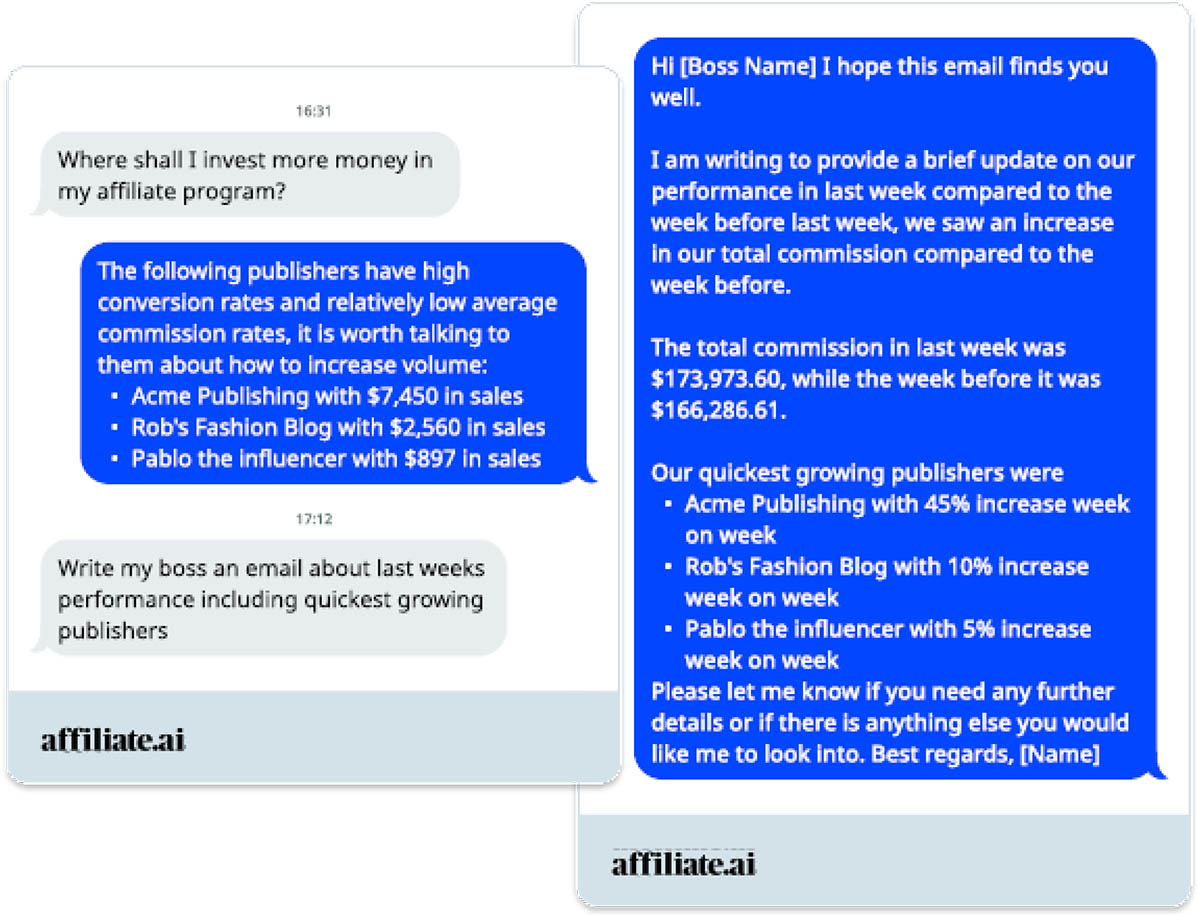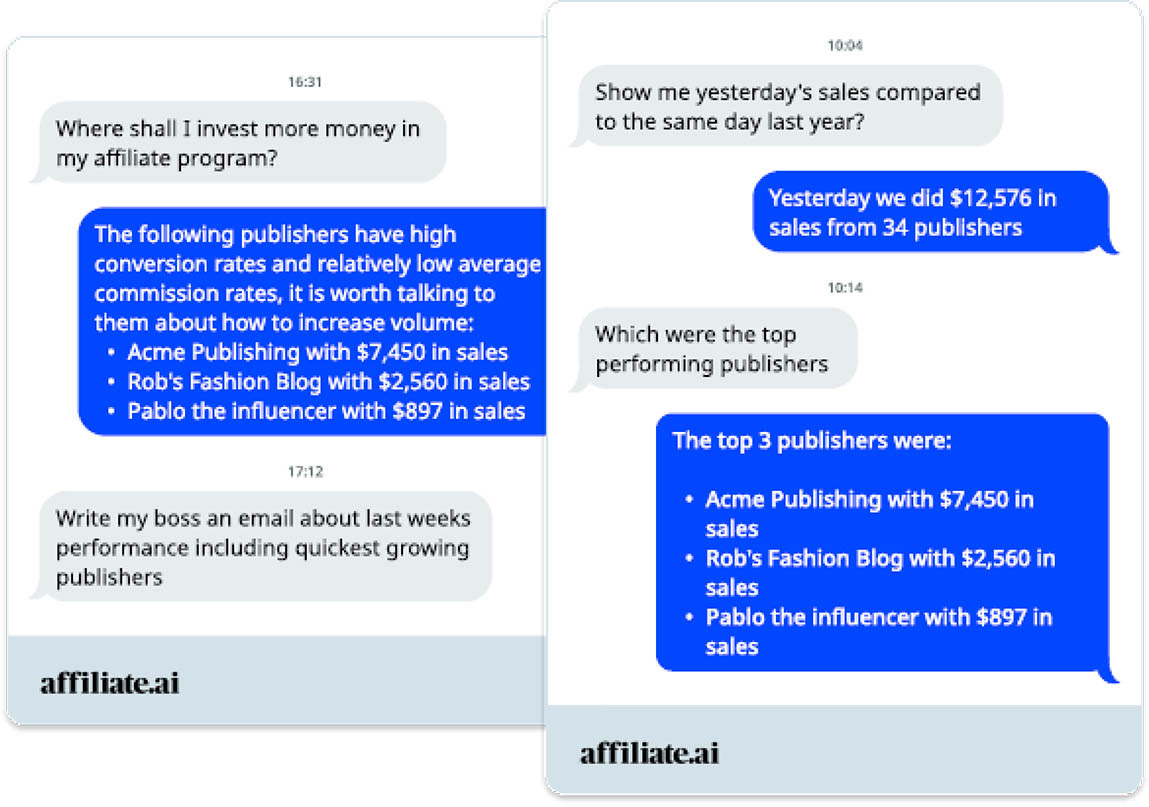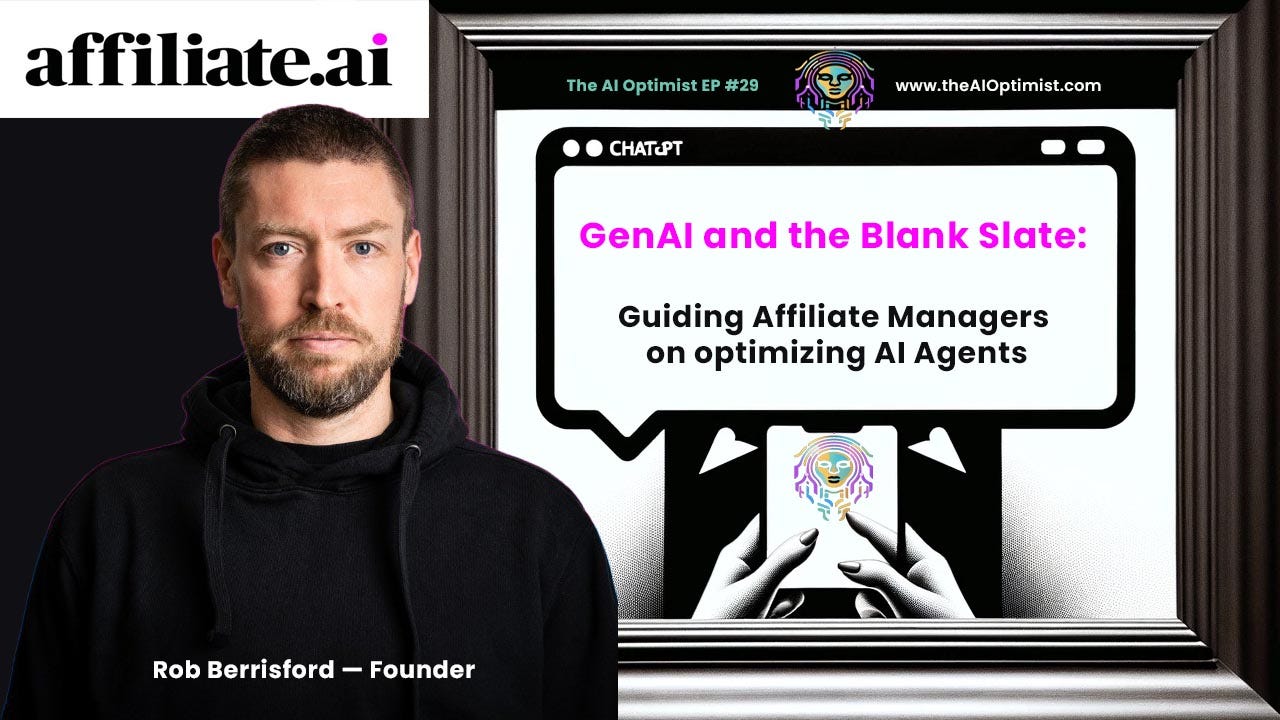Listen on Apple || Spotify || YouTube
In this pod discover why people are at the foundation of AI development, at least to one Optimist.
AI Agents saving time are the 2024 AI Theme, and this smart product designed for affiliate managers in a market the founder knows so well, is powerful in its simplicity.
And in true affiliate fashion, listening to users who got confused with the blank slate of the “prompt”, a common theme we cover in our session.
We’re talking with Rob Berrisford about his startup launched in 2023, Affiliate.ai, which is already shipping product in the early days of AI.
00:00:00 AI and the Blank Slate - Character.AI ish?
00:02:21 Intro to AI Startup Affiliate.ai and Rob Berrisford
00:04:14 Affiliate industry views on AI
00:05:18 GenAI Chat with Affiliate Network Data/Excel
00:07:58 More than Prompts - Guiding Users
00:10:05 The Blank Slate
00:12:46 AI First Movement vs. AI People First
00:13:22 Data and Relationships - the Affiliate Manager Cores
00:15:06 What problem does Affiliate.ai solve? Will AI eliminate affiliate managers?
00:17:11 Moving Beyond Excel? (Maybe not....)
00:19:20 The Affiliate.ai Roadmap - Onto, and back to, Machine Learning
00:21:09 GenAI and Machine Learning - Automation Question
00:24:34 What do you know about AI in the affiliate industry that few understand
AI and Tools included in this pod:
Affiliate.ai, https://affiliate.ai/
Character.ai, https://character.ai
Rob Berrisford is the founder of Affiliate.ai, leveraging conversational AI to enable users to chat with network data through natural language.
Leveraging his deep expertise across affiliate marketing, Rob launched Affiliate.ai in 2023 to bring the power of conversational AI and automation to affiliate reporting and insights.
Backed by over 20 years of experience across top networks, Affiliate.ai empowers affiliate managers to get more value from their data.
This approach contrasts with traditional data analysis tools that often rely on manual data and complex interfaces.
By prompting discussions with AI for tasks like generating reports and conducting business reviews, Affiliate.ai makes data analysis more accessible and intuitive, particularly for users without extensive technical expertise.
This human-centric design prioritizes ease of use and efficiency, significantly reducing the learning curve associated with data-driven decision-making in affiliate marketing.
Problem/Need Addressed:
Affiliate marketers spend a significant portion of their day manually pulling data, which hampers productivity and efficiency.
GenAI Solution:
Affiliate.ai offers a generative AI-powered solution to this problem, increasing daily output by up to 30%.
Keys from their approach include:
- Integration with major affiliate networks without requiring engineering efforts.
- Emphasis on privacy and security, ensuring data remains within the organization.
- Seamless data retrieval through Teams & Slack chatbots.
- Instant Assistant significantly speeds up data pulls, up to 90% faster.
Benefits and Value:
Affiliate.ai's AI tools enable affiliate marketers, agencies, brands, and publishers to boost productivity, make better decisions in less time, and streamline affiliate network data analysis.
This solution not only saves time but also enhances the overall efficiency of affiliate marketing operations.
In this episode of The AI Optimist, we dive into an intriguing discussion on using artificial intelligence (AI) to improve marketing and business operations.
Our guest, Rob Berrisford, is the founder of Affiliate.ai, a startup that connects affiliate managers to their affiliate network data via large language models (LLMs), allowing them to easily query performance metrics, generate reports, and more through natural conversation.
As Dunn notes, many businesses today spend 20-40% of employees' time simply organizing and analyzing data in spreadsheets – tedious, manual work ripe for automation.
And yet enterprise AI solutions often take an "AI-first" approach suited more to massive corporations than small teams.
Berrisford offers a refreshing people-centric perspective, building Affiliate.ai not just for efficiency but to empower marketing professionals.
Deeper Dive into the Pod
The episode provides insightful commentary around designing AI systems with human needs in mind first.
For instance, Berrisford admits early Affiliate.ai users struggled to formulate queries for its LLM with the "blank slate" chat interface, so prompting examples were added guiding users on what questions work well.
Likewise, canned responses assure users their queries are being handled while processing, reducing frustrations with the 10+ second latency.
On concerns that AI could replace affiliate managers' jobs, Berrisford suggests instead they will have more capacity for higher-value work building publisher relationships.
He envisions AI handling rote data tasks, so managers require less time per client account. Affiliate.ai also helps advertisers and agencies operate more accounts with fixed team sizes.
Berrisford explains how generative AI enables the natural language query system, while older machine learning methods still drive predictive analytics features being developed, like performance forecasting.
He argues that despite hype, stretching AI's capabilities into consistent, reliable business solutions remains challenging.
Focusing innovation on freeing up employee time piecemeal has proven more practical than automation-first ideals.
Ultimately, Affiliate.ai aims to embed actionable data within managers' daily workflows, via the collaboration tools they already use.
Berrisford believes for maximal user adoption; AI should enhance popular platforms like Excel rather than forcing entirely new habits.
With AI's help, perhaps affiliate marketing can finally leverage its wealth of data toward deeper performance insights.
Keys:
Lead with employee benefits when applying AI, not technology novelty or efficiency alone.
Carefully design interfaces minimizing user confusion around AI interactions.
Set realistic scopes for production AI systems with iterative enhancement over time.
Blend AI, data, and favorite platforms into existing business workflows for uptake.
Prioritize freeing user time for higher judgment tasks, full automation secondary.
What is an affiliate manager generally responsible for?
An affiliate manager is responsible for overseeing and developing an affiliate program. This role entails 10 key tasks and responsibilities:
(Items 3-9 require extensive analytics and data management, routing, and refining. It deeply undercuts outreach and relationship building, the core of affiliate marketing growth).
Recruiting New Affiliates: Identifying and recruiting new affiliates to join the program is essential. This involves researching potential affiliates, reaching out to them, and persuading them to join the program.
Affiliate Relationship Management: Maintaining a strong relationship with existing affiliates is vital. This includes regular communication, addressing their needs and concerns, and providing support to help them maximize their performance.
Performance Analysis and Reporting: Regularly analyzing the performance of affiliates is a core responsibility. This involves using tools like Excel for data analysis, creating detailed reports, and interpreting data to understand trends and identify areas for improvement.
Quarterly Business Reviews (QBRs): Conducting QBRs involves preparing and presenting comprehensive performance reviews. These reviews assess past performance, set future objectives, and discuss strategies for improvement.
Excel Analysis and Editing: Proficiency in Excel is essential for managing and analyzing large datasets. Tasks include creating and editing spreadsheets, using formulas and pivot tables, and visually presenting data through charts and graphs.
Optimization of Affiliate Program: Continuously optimizing the affiliate program to improve performance. This involves analyzing data to identify successful strategies and areas for improvement, and then implementing changes accordingly.
Compliance Monitoring: Ensuring that affiliates adhere to legal and program standards. This includes monitoring affiliate activities and intervening when necessary to maintain compliance.
Marketing Strategy Development: Collaborating with marketing teams to develop strategies that align with the overall marketing goals of the organization. This may involve creating promotional materials and campaigns tailored to the affiliate program.
Budget Management: Overseeing the budget for the affiliate program. This includes allocating funds, tracking spending, and ensuring a good return on investment.
Training and Support: Providing training and support to affiliates to help them succeed. This can involve creating educational content, hosting webinars, or offering one-on-one support.
An affiliate manager plays a pivotal role in managing and optimizing an affiliate program. The role requires a mix of skills in relationship management, data analysis, strategic planning, and marketing.
Key Understandings:
An affiliate manager must effectively recruit and manage relationships with affiliates.
Regular performance analysis and reporting, including QBRs and Excel proficiency, are decisive.
The role involves strategic planning, compliance monitoring, budget management, and affiliate support.
The data end of the business is often manual and demands Excel savvy. Details are the crux of the problem, details that conversational AI and streamlining data processes can help.
Started the business and delivered product in 2023, within the year, a rarity.
Affiliate.ai's emphasis on people-first AI design showcases a practical path forward.
With thoughtful guidance easing onboarding, conversational data queries via LLMs, and impending workflow automations, the startup aims to help affiliate marketers break free of tedious spreadsheet grunt work.
Still, as Berrisford acknowledges, bringing ambitious AI capabilities reliably into complex business contexts remains an ongoing challenge.
By maintaining expectations around emerging technologies while centering on user needs, Affiliate.ai demonstrates the wisdom of pragmatic, human-centric AI development.
















